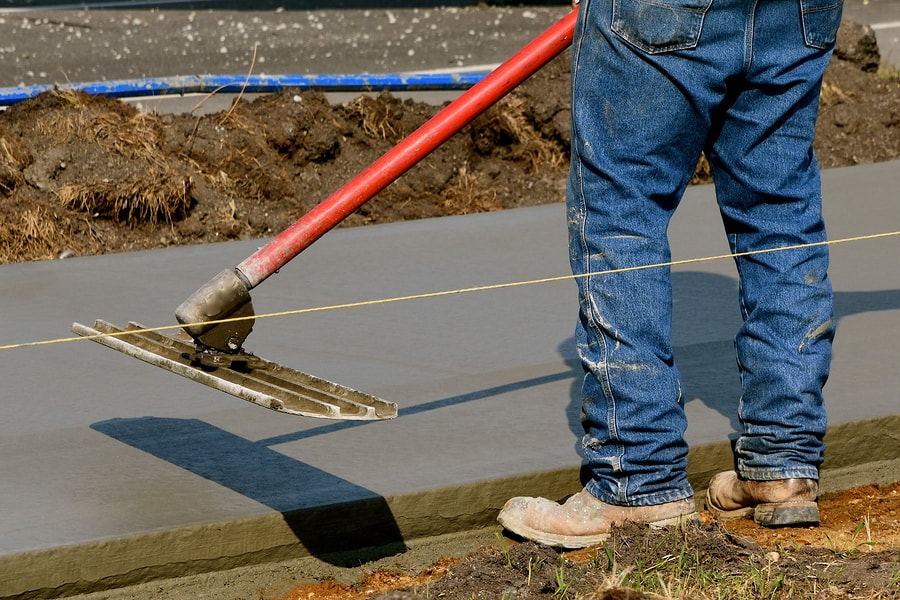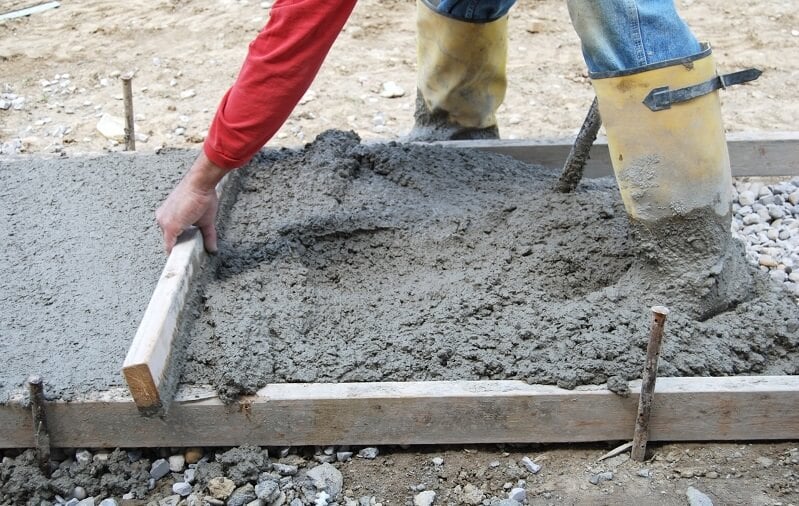
Understanding the Necessary Duty of a Concrete Contractor in Modern Building And Construction and Style
Concrete service providers are vital to the building and design industries. Their expertise assurances that frameworks are not just long lasting but additionally aesthetically pleasing. They engage in various duties, from job intending to quality assurance, and team up with engineers and designers. With evolving technologies and fads, their role is extra important than ever. Understanding their influence can disclose understandings right into contemporary building and construction methods and the future of structure layout.
The Relevance of Concrete in Construction
Although numerous materials are utilized in building and construction, concrete stays a foundation of modern-day structure methods due to its durability, stamina, and versatility. This composite product, made from concrete, water, and accumulations, can hold up against substantial anxiety and is immune to fire, climate, and insects, making it ideal for diverse applications. Concrete's versatility allows it to be molded right into various sizes and shapes, facilitating ingenious architectural designs.
Its thermal mass residential properties add to power performance, aiding to regulate interior temperature levels. The extensive accessibility of resources and the relatively affordable of concrete also boost its appeal for massive jobs, from business structures to framework like bridges and roadways. As urbanization continues to rise, the need for sustainable and reliable building products solidifies concrete's crucial duty in building and construction, making it a basic choice for contractors and architects going for longevity and strength in their projects.
Secret Duties of a Concrete Contractor
Concrete contractors play a vital duty in the building procedure, with a number of vital obligations that assure job success. Their jobs include job preparation and design, product choice and administration, as well as preserving quality control and guarantee throughout the job lifecycle. Understanding these responsibilities is important for valuing the contractor's effect on construction outcomes.
Task Preparation and Layout
When beginning on a building and construction task, reliable project planning and style play a crucial function in a concrete professional's duties. The service provider has to collaborate very closely with engineers, designers, and customers to recognize the project's specs and objectives. This involves evaluating website problems, reviewing style demands, and establishing the scope of job. A concrete professional is likewise in charge of developing budgets and timelines, ensuring that all stages of the job align with overall goals. Additionally, they need to expect prospective difficulties and devise solutions to keep job performance. By diligently planning and making each element of the concrete work, the service provider establishes the structure for successful implementation, making certain structural stability and adherence to safety and security standards throughout the construction process.
Material Option and Administration
Effective material choice and monitoring are important responsibilities for a concrete specialist, as these choices straight influence the top quality and toughness of the final framework. Concrete service providers should examine different materials, consisting of aggregates, admixtures, and support types, to guarantee they fulfill project specs and environmental problems. They have to think about variables such as strength, resistance, and workability to weathering. Furthermore, handling the supply chain is essential, as timely distribution of products can remarkably affect project timelines. Service providers have to keep relationships with suppliers to secure premium resources while additionally keeping track of supply levels to avoid unwanteds or scarcities. Eventually, this mindful selection and monitoring of materials add to the general success of building and construction projects and the longevity of the structures built.
Quality Assurance and Guarantee
Quality assurance and assurance are vital in the building and construction industry, particularly for concrete professionals entrusted with delivering resilient and reputable frameworks. Concrete professionals need to apply rigorous quality assurance steps throughout the building and construction procedure, ensuring that all products satisfy specified standards and laws (TJ Concrete Contractor). This includes checking the mixing, putting, and treating procedures to stop flaws and enhance structural honesty. Normal assessments are essential, enabling specialists to identify and correct problems immediately. Furthermore, concrete specialists often collaborate with designers and engineers to ensure that the last product straightens with style requirements. By adhering to rigid quality control protocols, concrete specialists not just safeguard the long life of their work but likewise support the trust of clients and stakeholders in the construction industry
Kinds Of Projects Taken Care Of by Concrete Specialists
Although concrete professionals are often connected with large-scale building projects, their knowledge prolongs to a diverse series of applications. These specialists are integral to household jobs, such as outdoor patios, driveways, and foundations, ensuring sturdiness and aesthetic appeal. In business building, they add to the creation of floorings, pathways, and structural components that meet specific layout and security standards.
Moreover, concrete specialists are involved in framework projects, consisting of roads, bridges, and passages, where their abilities guarantee structural stability and durability. They likewise play a crucial role in decorative concrete applications, such as stamped concrete and sleek surface areas, which enhance the appearance of numerous areas. In addition, their solutions include fix and upkeep job, resolving concerns like breaking or erosion in existing structures. This versatility highlights the necessary function concrete service providers play in both useful and attractive elements of modern-day building and construction and style.
Abilities and Qualifications Called for
Concrete specialists should possess a varied collection of abilities and credentials to efficiently handle the variety of projects more tips here they take on. Effectiveness in concrete mixing, pouring, and ending up is important, as is a solid understanding of numerous kinds of concrete, consisting of reinforced and attractive options. Understanding of construction methods, blueprints, and task administration concepts is vital for effective execution.
Moreover, physical stamina and strength are crucial as a result of the requiring nature of the job. Specialists should also have strong analytical capacities to attend to unforeseen difficulties throughout tasks. Interaction abilities are crucial for coordinating with customers, architects, and other tradespeople.
Additionally, acquiring pertinent certifications can boost a professional's trustworthiness and expand their profession chances. Continuous education and learning in new methods and materials keeps contractors competitive in a rapidly advancing sector. These abilities and credentials collectively allow concrete professionals to supply high-grade results successfully and properly.
The Duty of Concrete Specialists in Safety Compliance
Making sure safety conformity is a basic obligation of concrete specialists, as they browse the complexities of building websites. These experts are charged with sticking to rigid safety and security policies and requirements, which are critical for preventing accidents and making sure the wellness of all site employees. Concrete Contractor in Dallas. Concrete contractors need to execute comprehensive safety plans that consist of training employees on appropriate tools use and safety methods
Furthermore, they are accountable for evaluating materials and work processes to recognize possible dangers. By conducting routine safety audits and risk evaluations, concrete professionals can proactively resolve issues prior to they rise. They collaborate with other construction professionals, such as designers and task managers, to integrate security steps right into the overall job technique. Ultimately, the commitment of concrete service providers to security conformity not only shields employees but also boosts project efficiency and quality, reinforcing their important duty in modern-day construction.
Patterns and Developments in Concrete Design
Current developments in concrete design have actually introduced a series of fads and innovations that prioritize sustainability and aesthetics. Lasting concrete solutions, attractive finishing techniques, and smart concrete innovations are reshaping the industry. These developments not only boost architectural stability but also add to environmentally liable building and construction techniques.
Lasting Concrete Solutions
As the building and construction industry significantly prioritizes sustainability, cutting-edge concrete solutions are arising to decrease environmental influence while improving efficiency. One famous fad is making use of recycled products, such as smashed concrete and commercial results, which not only decreases waste yet also you can check here boosts the concrete's residential or commercial properties. Advancements in admixtures, including fly ash and slag, add to reduced carbon emissions throughout manufacturing. An additional substantial technology involves the growth of permeable concrete, which permits water to stream with and decreases overflow, alleviating flooding and groundwater depletion. Furthermore, the increase of carbon capture technologies in concrete these details production holds promise for further discharges decrease. These sustainable concrete options exemplify the industry's commitment to eco accountable building and construction practices.

Ornamental Ending Up Strategies
A wide variety of attractive finishing methods have actually arised in concrete layout, changing simple surface areas right into aesthetically striking components. Strategies such as marking, discoloration, and brightening enable a wide variety of visual opportunities, catering to varied layout preferences. Stamped concrete mimics natural materials like rock and block, while tarnishing presents dynamic colors that enhance the surface's appeal. Refined concrete, understood for its smooth finish, adds class to both business and property rooms. Additionally, microtopping and overlay systems supply cutting-edge alternatives for rejuvenating existing concrete. These strategies not just enhance the aesthetic characteristics but additionally enhance durability and maintenance. As patterns advance, the integration of decorative finishes proceeds to play an important function in modern building and construction, weding performance with imaginative expression.

Smart Concrete Technologies
While traditional concrete continues to be a staple in building, the appearance of wise concrete innovations is revolutionizing the market by incorporating advanced features that enhance efficiency and sustainability. These innovations include self-healing concrete, which utilizes embedded microorganisms that turn on upon fracturing, and sensor-equipped concrete that keeps an eye on architectural health in real-time. In addition, piezoelectric and thermochromic concrete can adapt to environmental modifications and produce electrical energy, specifically. The application of recycled products and environment-friendly additives likewise contributes to decreasing the carbon footprint of concrete manufacturing. As these modern technologies proceed to progress, they promise to enhance longevity, lower maintenance prices, and promote greener structure practices, making them important for future construction tasks. The function of concrete professionals is increasingly substantial in utilizing these innovations.
Frequently Asked Inquiries
What Aspects Influence Concrete Prices in Building And Construction Projects?
Concrete pricing in construction projects is influenced by material costs, labor expenditures, job size, location, accessibility of resources, and market demand. Seasonal elements and transportation expenses can also significantly influence the total pricing framework.
How Do Weather Impact Concrete Job?
Weather condition conditions considerably affect concrete work; extreme temperatures, humidity, and precipitation can affect setting times, treating processes, and general high quality - Concrete Contractor in Dallas. Professionals have to adapt their methods and timetables to minimize these ecological influences for successful project conclusion
What Is the Normal Timeline for a Concrete Task?
A typical concrete project timeline ranges from a couple of days to several weeks. Elements influencing this period include job dimension, intricacy, weather, and curing times, which collectively determine the total completion routine.
Can Concrete Professionals Aid With Style Assessments?
Concrete contractors can certainly assist with style consultations, giving valuable understandings on material selection, structural integrity, and visual options, making certain that tasks meet both practical needs and the client's vision for the ended up product.
What Are Typical Mistaken Beliefs About Concrete Longevity?
Common mistaken beliefs regarding concrete resilience include the belief that it is invulnerable to damage and that all kinds are equally strong. In truth, elements like mix style, environmental problems, and maintenance greatly affect concrete's long-term performance.
They likewise play a crucial duty in attractive concrete applications, such as stamped concrete and polished surfaces, which boost the aesthetic aspect of different areas. Effectiveness in concrete mixing, putting, and finishing is crucial, as is a strong understanding of numerous kinds of concrete, including enhanced and attractive options. One noticeable fad is the use of recycled materials, such as smashed concrete and commercial results, which not just decreases waste yet additionally enhances the concrete's homes. While conventional concrete stays a staple in construction, the development of clever concrete technologies is reinventing the market by integrating sophisticated functions that enhance efficiency and sustainability. These advancements include self-healing concrete, which makes use of embedded germs that activate upon splitting, and sensor-equipped concrete that monitors structural health in real-time.